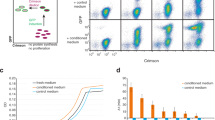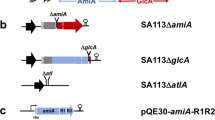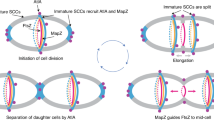Abstract
MANY bacteria lyse when growth of the cultures ceases, irrespective of whether growth has stopped because of the exhaustion of the growth medium or the addition of toxic substances such as the penicillins to the cultures. Lysis is caused by the presence in the microorganisms of autolytic enzymes (autolysins) which specifically hydrolyse mucopeptide polymers in the bacterial cell wall. The attack occurs, at least in some species, in a very restricted area around the point at which the bacteria will divide1,2. This has led to suggestions that the autolysins are involved in bacterial growth. Three sorts of hypotheses have been suggested. First, that the enzymes are essential to make openings in the supposedly continuous network of mucopeptides in the wall3,4 so that the new building blocks can be added during growth3,5; second, that the enzymes are essential for the remodelling of the wall in making the septum that divides one bacterium into two daughter cells6,7; and third, that they are necessary to break the two newly formed bacteria apart from each other8.
This is a preview of subscription content, access via your institution
Access options
Subscribe to this journal
Receive 51 print issues and online access
$199.00 per year
only $3.90 per issue
Buy this article
- Purchase on Springer Link
- Instant access to full article PDF
Prices may be subject to local taxes which are calculated during checkout
Similar content being viewed by others
References
Shockman, G. D., and Martin, J. T., J. Bacteriol., 96, 1803 (1968).
Higgins, M., Pooley, H. M., and Shockman, G. D., J. Bacteriol., 103, 504 (1970).
Shockman, G. D., Bacteriol Rev., 29, 345 (1965).
Braun, V., and Schwarz, J. Gen. Microbiol., 57, iii (1969).
Rogers, H. J., and Perkins, H. R., Cell Walls and Membranes (Spon, London, 1968).
Rogers, H. J., J. Gen. Microbiol., 32, 19 (1963).
Perkins, H. R., Bacteriol. Rev., 27, 18 (1963).
Lominski, I., Cameron, J., and Wylle, G., Nature, 181, 1477 (1958).
Lacks, S., J. Bacteriol., 101, 373 (1970).
Tomasz, A., Albino, A., and Zanati, E., Nature, 227, 138 (1970).
Brown, W. C., and Young, F. E., Biochem. Biophys. Res. Commun., 38, 564 (1970).
Mosser, J. L., and Tomasz, A., J. Biol. Chem., 245, 287 (1970).
Brown, W. C., Frazer, D. K., and Young, F. E., Biochem. Biophys. Acta, 198, 308 (1970).
Janczura, E., Perkins, H. R., and Rogers, H. J., Biochem. J., 80, 82 (1961).
Hughes, R. C., Biochem. J., 117, 441 (1970).
Author information
Authors and Affiliations
Rights and permissions
About this article
Cite this article
FORSBERG, C., ROGERS, H. Autolytic Enzymes in Growth of Bacteria. Nature 229, 272–273 (1971). https://doi.org/10.1038/229272a0
Received:
Revised:
Issue Date:
DOI: https://doi.org/10.1038/229272a0
This article is cited by
-
Envelope mutation promoting autolysis in Salmonella typhimurium
Molecular and General Genetics MGG (1976)
-
Turnover of murein in cellular and filamentous populations ofBacillus megaterium
Folia Microbiologica (1974)
Comments
By submitting a comment you agree to abide by our Terms and Community Guidelines. If you find something abusive or that does not comply with our terms or guidelines please flag it as inappropriate.



